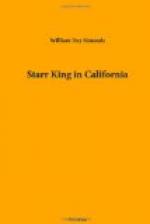The latest and most complete history of California based upon the most trustworthy evidence extant gives cautious tribute to the Starr King of this period as follows:
“The Republicans had lost their most effective orator since the campaign of the preceding year, Colonel Baker, but his loss was in some degree compensated for by the appearence of an unheralded but equally eloquent speaker, Thomas Starr King, who arrived in April, 1860, and later toured the state, giving lectures on patriotic subjects but always declared for the Union and the Republican candidates as the surest guaranty of its preservation.
Tuthill, in his history of the time writes with more warmth, and probably more truth:
“There was a charm in King’s delivery that few could resist. He was received with applause where Republican orators, saying things no more radical, could not be heard without hisses. Delicately feeling his way, and never arousing the prejudices of his hearers, he adroitly educated his audiences to a lofty style of patriotism. The effect was obvious in San Francisco where audiences were accustomed to every style of address; it was far more noticeable in the interior.
The celebrated critic and writer, Edwin Percey Whipple, made a careful examination of King’s record in California and sums up his impressions as follows:
“As a patriotic Christian statesman he included the real elements of power in the community, took the people out of hands of disloyal politicians, lifted them up to the level of his own ardent soul, and not only saved the state to the Union, but imprinted his own generous and magnanimous spirit on its forming life.”
Writing a little later and with even more enthusiasm, another authority, speaking of King’s charm of manner, says:
“I am persuaded that could he have gone through the Southern states, shaking hands with secessionists, he would have won them back to their allegiance by the mere magnetism of his touch.”
It is, perhaps, impossible at this late date to estimate the effect of Starr King’s appeal to the voters of California in the presidential election of 1860. As we have already noted, Lincoln carried the State by a very narrow plurality, and we need not ascribe the swaying of many votes to the eloquence of King’s advocacy to make it appear that his influence was marked in that memorable campaign.
But here must be emphasized a fact, quite often overlooked, and always to the serious perversion of history. In California, as in every doubtful state, the Hour of Decision did not precede, but in every instance, followed the elevation of Lincoln to the presidency. It was upon this rock that the nation split. Shall a Black Republican be permitted to sit in the seat of Washington? Shall a man elected, as a matter of fact, by a sectional minority rule over Virginia — mother of Presidents — over imperial Texas, or the Golden West? To us the case seems




